- Home
- James A. Michener
Poland: A Novel Page 7
Poland: A Novel Read online
Page 7
With the same enthusiasm he would have shown had he commanded a battalion of well-equipped cavalry, he assembled his fragile troop, then dispatched the older Jan to the far side of the Vistula to locate Zygmunt and any other gentry who had escaped with their horses. His orders were: ‘You are to come back across the river and assemble at Castle Gorka.’
There the expeditionary force was organized, a pitiful rabble of men whose wives and children had been slain, of cavaliers with wretched horses or none, of lancers with no weapons. They comprised about ninety men, if one counted the foot-servants who tagged along and the boy Jan. They set forth immediately for Krakow, hoping to arrive before the Tatars could mount their attack, and when young Jan saw the golden city for the first time, with its splendid towers and walls, and formidable castle and shops with incredible riches, he told his father: ‘They can never capture such a city,’ but the woodsman whose eyes were trained to note differences saw quickly that the supposed defenses were more show than reality. He would not allow such walls to be built in the village of Bukowo.
The boy, like his elders, was perplexed by the young duke to whom all present owed allegiance, for although he was sovereign in this part of Poland, he seemed never to know what exactly to do and he alternated between surges of heroic optimism and torments of despair, so that on this day he was prepared to defend the city with his life and on the next he was seeking counsel as to the best way to surrender the town before the Tatars started to burn it. When Jan asked a local soldier about such contradictions, because Krzysztof of Gorka certainly displayed great constancy, the Krakow man explained: ‘You must excuse the duke. He doesn’t know whether Krakow belongs to him or not, or even whether he belongs to Krakow.’
This sounded silly, so Jan asked what the man was saying, and the latter replied: ‘Poor fellow. His friends have put him on our throne five times, but his enemies have kicked him off four times.’
‘Do they want someone else?’ Jan asked.
‘No. The people of Krakow don’t want to be ruled by anyone.’
Jan pondered this during most of one night when he was helping pile logs across the main entrance to the city, and he thought it strange that a big city like Krakow could not govern itself intelligently when a little village like Bukowo could: Our knight tells us what to do and we do it. When the priest comes he tells us how to remain friends with Jesus and we do what he says. Here they have a duke and an archbishop, but nobody obeys.
Next day at noon, when the Tatars were reported on the outskirts to the north, Jan became totally confused, for word flashed through the defenders that the duke, terrified by the prospect of what might happen in the next days, had fled the city completely, taking along two women he liked, with the intention of crossing the mountains into Hungary, where there was peace and where the Tatars never came. In its moment of maximum peril, Krakow was abandoned by its legitimate ruler.
It was curious that no one in the remaining leadership considered even for one moment marching north to engage the Tatars in preventive battle: ‘They’re so swift they’d overwhelm us. The horses of our cavalry are too slow. With Tatars there’s nothing to do but hide until they go away.’
Krzysztof alone wanted to sally forth, and he believed he had tactics which would neutralize Tatar mobility, but he was forbidden to try. Polish strategy, with the young duke gone, consisted of selecting the largest churches with the stoutest walls and hiding therein as many citizens as possible, then praying that the walls would stand until the Tatars ran out of food or patience.
Four times Krzysztof addressed the knights, pleading with them to take decisive action, but they had no concept of union or strong leadership or concerted movement toward a common goal; they were men of insolent freedom, and the abuse they had showered upon their reasonably capable young duke they also showered upon any one of their own members who threatened to stick his head above the generality. Poles hated strong leadership, and when Krzysztof of Gorka showed signs of exerting it they cut him down.
‘You have been given St. Andrew’s church with the big cloister,’ the commanders told him. ‘Allow as many citizens inside as it will hold, and pray.’
On 21 March 1241 red-headed Krzysztof, aware of the disgraceful act he was performing, led his Bukowo men into the nave of the fine old church with the stoutest walls in Krakow, and there they accepted seven hundred residents of the city, including a group of priests who started prayers that the church might be spared. There they remained for three awful days and nights, shivering in terror as they heard the Tatars galloping into the city, where fires began to rage and women scream. They could hear the destruction moving methodically from street to street, until it reached the area of the church itself, crashing at last against the powerful walls. They cringed as they heard great oaken beams come thundering at the gates, and they watched with terror as the gates swayed inward, but at this point Krzysztof and his strongest men rushed forward to support the doors, and they held. When the Tatars tried to set the gates afire, men from aloft poured down precious water, and again the doors were saved, but the screams and the galloping of horses continued throughout the three days.
On the fourth morning, at about the ninth hour, one of Krzysztof’s watchmen on the tower shouted: ‘They’re moving off!’ and when excited aides rushed up to verify the report, they saw that the Tatars were indeed quitting the city, but they also saw that Golden Krakow of the beautiful towers, this center of light and commerce and religion, had been put to the torch, and when the gates of St. Andrew’s were swung open, at noon on 24 March, the survivors walked out in a stupor to see only the charred remains of what had been one of the world’s illustrious cities.
Krzysztof of Gorka did not waste time in lamentation; he more than most could appreciate the terrible loss which had occurred here, but he also knew that only a relentless pursuit of the Tatars, an incessant harassment of their flanks, would ever turn them back from their devastating sweep through Christian Europe, and he was grimly determined to provide that harassment.
Collecting all the remnants he could, and turning the governance of the city over to the aides of the absconded duke—for his enemies knew nothing of government except how to overturn it—he marched westward, hoping to encounter other remnants who would coalesce to oppose the Tatars on some battlefield more favorable to the Polish cause.
* * *
The spring of 1241 was one of the darkest periods in Polish history, for the rampaging Tatars had ripped the fledgling nation into shreds. Krakow lay in ruins. The Vistula was closed to river traffic. Fields were left barren and centers of production were burned out. There seemed to be no cohesion anywhere, and deep shadows covered the land.
Krzysztof was faring as poorly as his land. His two best horses had been killed and the ones that remained were not strong, but he did have this fellow Zygmunt of Bukowo, who was proving to be a man of some stability; if you told him to hold a difficult position, he held it. He was not intelligent and could not follow a complex argument, but when his neck muscles tightened and his shoulders squared he could be formidable. There were a few others like him, so with undiminished conviction that the Poles would triumph in the end, Krzysztof led his remnants westward to intermediary battles he knew they could not win.
He mustered a half-hearted stand at Raciborz, where the Poles were almost annihilated by the brilliant horsemanship of General Pajdar and his united forces. Undaunted, he regrouped and retreated stubbornly to the town of Opole, where he fell in with an enormously fat duke named Mieszko Otyly, Mieszko the Obese, who displayed some skill in generalship. With Krzysztof’s daring help, the fat one laid a trap for the Tatars as they attempted to cross the Oder River, and the Polish forces might have won their first real victory except that at the height of the battle Mieszko the Obese grew frightened at the magnitude of what was happening and ordered a full retreat. He might have been overly cautious; he might have been downright cowardly; or he might have shown real brilliance in damaging the Ta
tars and moving off before they could annihilate him. Regardless of what impelled his move, he allowed the Tatars free access to the riverbanks, but he did save his troops for a disorganized retreat to the formidable city of Wroclaw, called Breslau by the Germans, where at last Krzysztof heard some reassuring news.
Wroclaw could be defended, for it, too, stood on the Oder River; it had steep flanks; it already contained a large number of troops; and best of all, it was governed by a remarkable pair: Hedwig, a strong-minded German princess who had come here decades ago to marry a dashing Polish count, now dead; and her able son Henryk Pobozny, Henry the Pious, a sagacious, just and heroic man whose ambition it was to unite the many shattered dukedoms like Krakow’s into one powerful nation. To achieve this, he realized that he must demonstrate his leadership by being the only Polish commander to defeat the Tatars.
When Krzysztof first met Henry the Pious he liked him and saw a chance that here at last was a leader capable of establishing order among the Polish forces and common sense among their captains. Hope began to germinate, but when Krzysztof met Hedwig, whom the years would consecrate as a saint, he was trebly encouraged. She was a rare woman; after she and her husband had produced seven children, she cried ‘Enough!’ and retired to a monastery, from which she continued to give counsel and even rule when her powerful husband was incapacitated.
She was especially likable when she appeared with her son, for his strength and piety were reinforced by her German sagacity, and no part of Poland was better governed than the lands adjacent to Wroclaw. Krzysztof sensed this immediately as he talked with Hedwig and her son, but he was even more impressed by a much different group of Germans who rode in from the Baltic coast.
He saw them first as they approached the north gate of Wroclaw, a company of some four hundred knights, all big, all strong, all blond, all dressed in black, with capacious white surplices covering their armor and proudly displaying the mark of their order: a huge black cross standing out boldly against the white ground. These were the Teutonic Knights, a holy order blessed by the Pope himself and commissioned by him to carry Christianity to the heathen lands facing the Baltic. Each item of their appearance, from their supple chain armor to the arbalests some carried to the grim set of their mouths, announced that here were men ready for battle, and Krzysztof joined the other watchers in cheering their arrival.
They were led by a handsome man in his fifties, Wolfram von Eschl, who, when he approached Hedwig and her son, threw himself before them, grasped the hem of Hedwig’s gown, and cried: ‘We have come to serve Christ in your behalf.’
‘Rise,’ she said quietly. ‘We have great need of you.’
In the council directing the defense of Wroclaw, Krzysztof was struck by how similar his own assessments were to those of Von Eschl. Both men believed that Polish troops must meet Tatar mobility by great free movements of their own. Both felt that the place to strike the Tatars was when they attempted to cross the Oder again. And most significant of all, both were convinced that the Poles could win if they kept hacking away remorselessly at the Tatar flanks.
Von Eschl also endeared himself to Krzysztof by saying bluntly: ‘We must watch this Fat Mieszko. I don’t like him, and I fear that if the battle grows fierce …’ He shrugged his shoulders.
‘At Opole he ran away, so don’t count on him in your plans,’ Krzysztof said, but he was concerned with deeper matters. ‘I’m sure the Tatars know they must subdue Wroclaw or their passage west will be prohibited. They can’t afford to bypass us. And they can’t sustain a siege. So what we must prepare for is a frontal assault.’
To inhibit this, Henry the Pious decided to meet the Tatars a goodly distance east of the city, and there he positioned a major part of his army, with Krzysztof and the Germans on his right flank, and when the two had studied the terrain, Von Eschl said with sober calculation: ‘I’m not sure we can hold them here. Quite possibly we’ll have to fall back into the city.’
‘But certainly we’ll do what damage we can,’ Krzysztof protested.
‘That we will!’ the German agreed. ‘It’s like our constant battles with the Lithuanians. Hack away at them whenever you can. Punish them as sorely as you can. But when they outnumber you with better horsemen and more spearmen, let them go past and wait for a better day. But even as they go, cut at their horses, wear them down.’
Von Eschl’s anticipation of this preliminary battle proved amazingly accurate. The Tatars knew that this time they could not afford to bypass this linchpin in Europe’s defenses and they supposed that the best way to take it was by overwhelming the Poles in the first skirmish, and this they did. At their first flight of arrows, which came humming like a flight of deadly birds, Fat Mieszko turned and took his needed brigades with him, leaving a vast empty space into which the Tatars galloped and from which they spread destruction on all sides.
Within less than an hour the battle was over, a total rout, but even so, when Krzysztof and Von Eschl studied the results, they saw cause for hope, glimmering though it was at a far distance. ‘In this battle,’ the Teutonic Knight said, ‘they’ve tasted real opposition. The fat one fled, true, but you and I made them pay viciously for every horse they stole. You’re wondering tonight, Red Head. And I’m wondering. But be damned, the Tatars are beginning to wonder most of all. The next battle, that’s when we’ll get them.’
‘Always you say “the next one,” ’ Krzysztof said, and Von Eschl, whose ancestors had fought in the Holy Land and Hungary and Prussia and Lithuania, replied: ‘A soldier lives always for the next battle, because he knows that before it arrives impossible changes can occur in his favor.’ When the stars came out, he pointed to the defenses of Wroclaw: ‘Imagine what we’ll do to them when they try to attack the city!’
To the surprise of these two tested warriors, the assault on Wroclaw never came, for early next morning Henry the Pious announced that all troops would be withdrawn forty miles to the west, where they would engage the Tatars in a culminating battle around his secondary castle at Legnica. So without firing an arrow, the Tatars took their third ducal city, and as they burned and raped, shouted that now all lay supine before them.
This was not the case. Dowager Hedwig had summoned from all neighboring nations allies to unite in one great effort to repel the invaders, and now the army would comprise not only her son’s tested Silesians but also South Germans and Bohemians and a scattering of Frenchmen, and particularly, the huge Teutonic Knights with their blazing white tunics and black crosses. But on 8 April 1241, Krzysztof and Von Eschl were walking through the castle grounds, swearing to one another how each would deport himself the next day, when a massive stone dislodged itself from a cornice and fell only a few feet ahead of the duke.
‘It’s an omen!’ his men shouted, and news spread through the allied camp that God had warned Henry the Pious not to start the battle on the morrow, and that night, when Dowager Hedwig added her pleas that everything wait till a contingent of Hungarian mercenaries arrived from the south, Krzysztof had an opportunity to witness behavior which justified Henry’s name of Pious, for the duke said with prayerlike gravity: ‘Beloved Mother, I cannot wait even one day longer, because great is the misery of my people as they die under the Tatar lash. Therefore I must fight tomorrow, and risk my life, and await death itself if I am fated to die in defense of our Christian faith.’
He prayed most of that night, and in the morning he moved as if an aureole placed by God Himself hovered above his head. Inspiring his men as never before, he led them into battle, ten thousand Poles against twenty thousand Tatars, and he came very close to winning an inspired victory, for aides like Krzysztof of Gorka and Wolfram von Eschl ripped at the Tatar flanks, causing terrible disruption, but in the end the miracles which the Poles hoped for favored not them but the Tatars.
It was when the battle hung in the balance that a company of six Tatars rode toward the Polish lines with the wind strongly at their back, carrying aloft a monstrous red banner with an X painte
d across it. On top of one of the shafts supporting the banner stood the carving of an ugly black head, its chin buried in black hairs, its eyes glaring defiance. When the Tatars reached a point only a hundred paces away, the men began to shake the giant banner with all their might, and immediately this huge black head started to puff out large clouds of smoke which stank so awfully that it nearly knocked the Polish cavalry off their horses, and caused them to choke and even to vomit. And there was confusion everywhere.
At this moment a man rushed from the Tatar lines as if he were a prisoner escaping, and he dashed into the middle of the Polish troops, shouting in good Polish: ‘Run! Run! All is lost!’ And by ill luck this spy ran directly into the section captained by Mieszko the Obese, who became so terrified by the biting smoke and the wild shouts that again he fled the battlefield with all his troops.
With shock and sorrow Krzysztof saw chaos overtake the Polish lines, where a score of leaders were cut down, but there was still a chance to restore reason, so he galloped to where Von Eschl in his white tunic was inflicting real damage on the invaders. But as they fought side by side Krzysztof happened to look across the fray, and saw the Tatars surround the duke, and isolate him, and stab at him many times, and finally sever his head from his body.
In great rage he led his Poles and Von Eschl’s Germans in pursuit of the Tatars who carried away the head, but he was frustrated by thousands of fresh Tatar cavalry who now entered the battle, and as day waned, all hope of a Polish victory vanished. But remembering Von Eschl’s doctrine that one hacked and chewed at an enemy as long as possible, he did just that, but in time his third horse was killed under him, and he had to pursue his vengeance on foot, for he could not locate young Jan, who was tending the fourth horse.

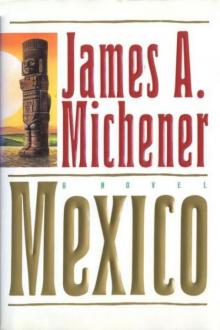 Mexico
Mexico The World Is My Home: A Memoir
The World Is My Home: A Memoir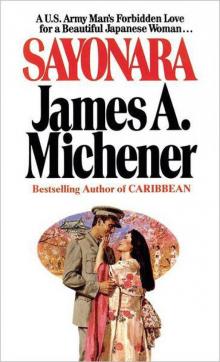 Sayonara
Sayonara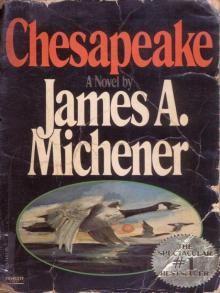 Chesapeake
Chesapeake The Novel
The Novel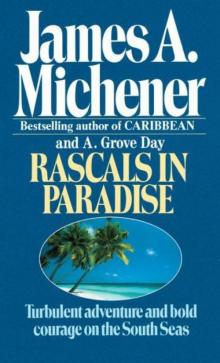 Rascals in Paradise
Rascals in Paradise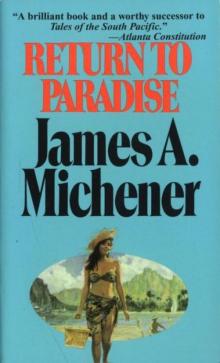 Return to Paradise
Return to Paradise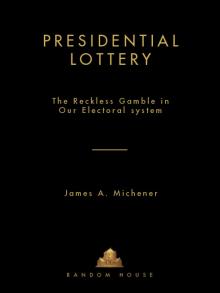 Presidential Lottery: The Reckless Gamble in Our Electoral System
Presidential Lottery: The Reckless Gamble in Our Electoral System The Source
The Source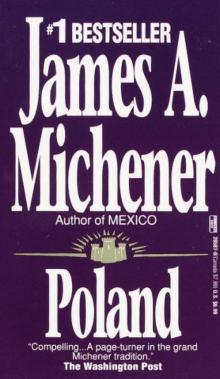 Poland
Poland Space
Space Caravans
Caravans Creatures of the Kingdom: Stories of Animals and Nature
Creatures of the Kingdom: Stories of Animals and Nature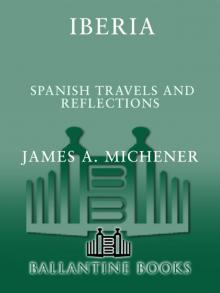 Iberia
Iberia Hawaii
Hawaii The Watermen: Selections From Chesapeake
The Watermen: Selections From Chesapeake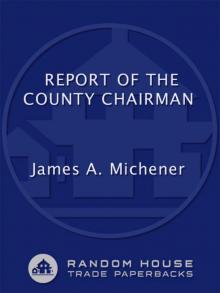 Report of the County Chairman
Report of the County Chairman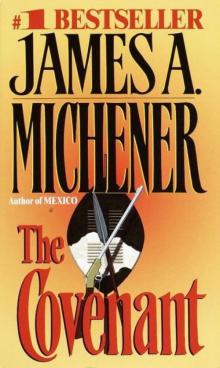 The Covenant
The Covenant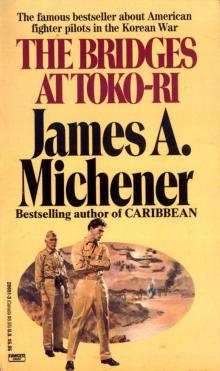 The Bridges at Toko-ri
The Bridges at Toko-ri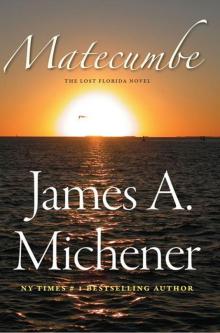 Matecumbe
Matecumbe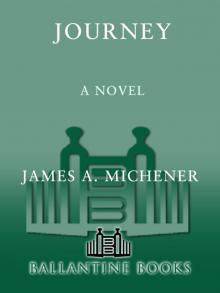 Journey: A Novel
Journey: A Novel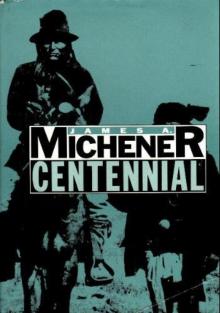 Centennial
Centennial Sports in America
Sports in America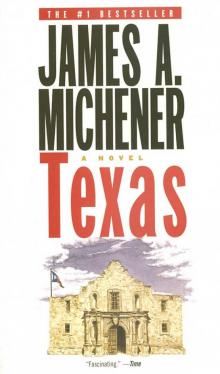 Texas
Texas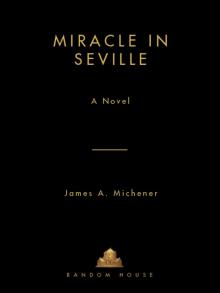 Miracle in Seville
Miracle in Seville This Noble Land: My Vision for America
This Noble Land: My Vision for America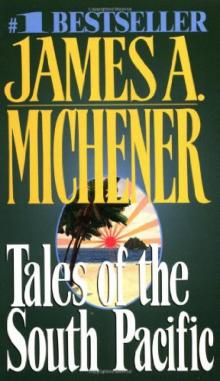 Tales of the South Pacific
Tales of the South Pacific Bridges at Toko-Ri
Bridges at Toko-Ri Space: A Novel
Space: A Novel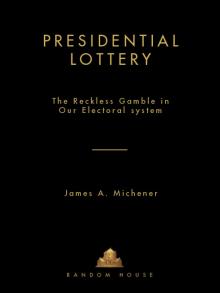 Presidential Lottery
Presidential Lottery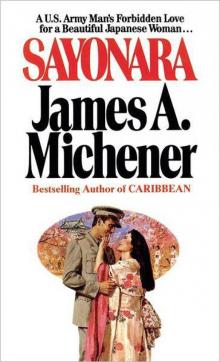 Sayonara: A Novel
Sayonara: A Novel This Noble Land
This Noble Land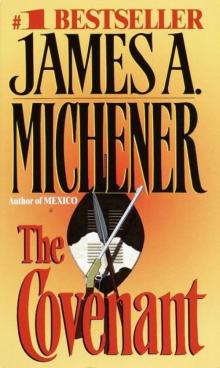 The Covenant: A Novel
The Covenant: A Novel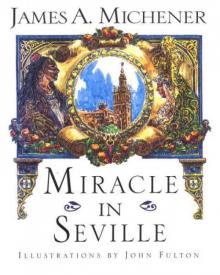 Miracle in Seville: A Novel
Miracle in Seville: A Novel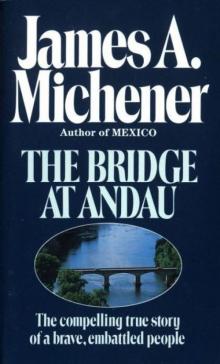 The Bridge at Andau
The Bridge at Andau Source
Source The Source: A Novel
The Source: A Novel Journey
Journey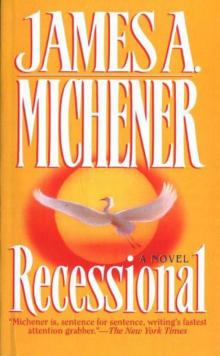 Recessional: A Novel
Recessional: A Novel Legacy: A Novel
Legacy: A Novel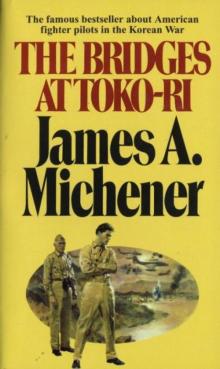 The Bridges at Toko-Ri: A Novel
The Bridges at Toko-Ri: A Novel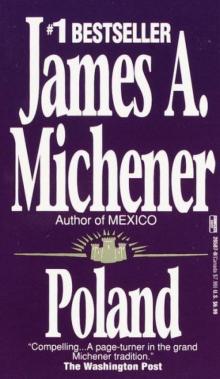 Poland: A Novel
Poland: A Novel